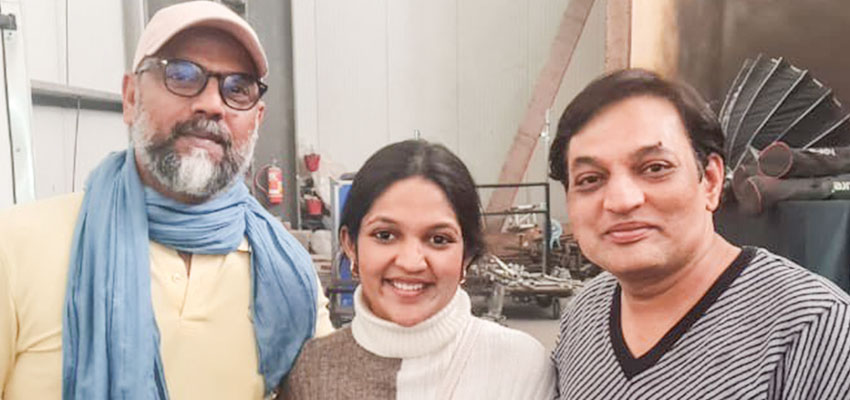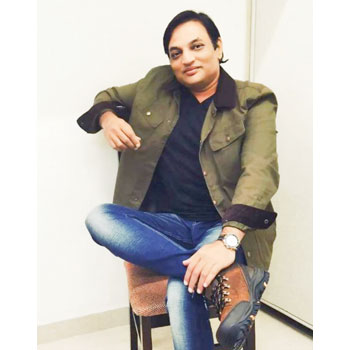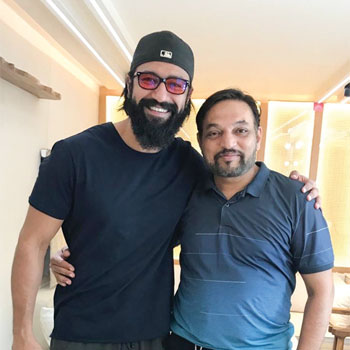Decoding Chhaava

Blockbuster movie Chhaava, headlined by actor Vicky Kaushal, and based on the life of Chhatrapati Sambhaji Maharaj, the son of Chhatrapati Shivaji Maharaj, has connected with moviegoers across the board. So, Corporate Citizen gets talking to Unman Bankar, one of the screenplay writers, on the secret of its success, not to forget management lessons from a king whose aura has been overshadowed by that of his legendary father
It’s a seminal moment in Unman Bankar’s life as a screenplay writer. While he’s no stranger to success— having had several hits on the Marathi screen with critically acclaimed films like Lokmanya, Gadbad Gondhal and the web series Gondya Aaala Re—savouring the success of a pan Indian blockbuster like Chhaava is another moment altogether.
At last count, the film is said to have crossed Rs600 crores in collections worldwide and there is talk of a Telegu version. But, Unman Bankar, one of the screenplay writers, is not the one to talk of numbers. “Frankly, a writer is a creative person. For his/her work to strike such a chord, feels amazing. Yes, figures count, but at the end of the day, what matters the most is that the sacrifice of Chhatrapati Sambhaji Maharaj, on whose life the movie is based, has moved the hearts of so many,” he says.
Corporate Citizen: Chhaava is based on the famous Marathi novel by Shivaji Sawant.
Unman Bankar: When lockdown happened on the backdrop of the 2020 pandemic, a lot of production work came to a stand-still. With time on hands, I decided to catch up on my reading. One of the books I got my hands on was Chhava, the famous historical novel by Shivaji Sawant. The book was a page turner, and I just couldn’t stop until I had finished.

CC: So, how did this become a film?
As I was reading the work, I got a call from Omkar Mahajani, the other writer of the film. He had seen one of my works and reached out for a project: Would I write it with him? "Of course," I said. I would be absolutely delighted. But, there was a caveat, he added. It would be a Hindi film and not a Marathi one—that made it even more exciting.
That evening we got on zoom call with the director Laxman sir (Laxman Utekar), and he expressed his wish to bring to life the story of Chhatrapati Sambhaji. “Have you read Chhava?” he asked. “I just finished reading it,” I said excitedly. And, that was indeed a sign that here was a film whose time had come.
CC: Tell us about the process of bringing the elements of such a humongous work together.
He was clear on his vision on presenting Chhatrapati Sambhaji as a warrior and that helped us take it ahead. When it came to casting, we were unanimous in our choice of actor Vicky Kaushal—who had the talent, the chameleon-like ability to get under the skin of the character, to become as larger than life as him. In all, the script writing took 2.6 years and the shooting some 130 days.
CC: What was it like working with Vicky Kaushal?
Fantastic on all levels. He is a fantastic actor, and a grounded human being. We were surprised to see him attending script readings whilst it was still being written, even more surprised to hear him speak clean Marathi. And, that simply reinforced our faith that he was the right man for the job.
CC: What are the management lessons that one can draw from the making of Chhaava?
For one, to be true to one’s original vision. We were clear how we wanted Shambhu Raje to be portrayed and resisted the temptation to wander from that. Next, Laxman sir made for an excellent captain. He steered our ship in a very calm, composed manner and heard us all out. We had the freedom to dissent and argue, indeed he welcomed a better idea each time he sensed it. Thirdly, content is king and kings cannot be rushed! Two and a half years is a long time, but not unreasonable for a work like this. There were subtle nuances we could not get wrong, the audience would not forgive it.
Fourthly, the message was conveyed via the right medium. For a moment or two, we toyed with the idea of making a web-series but Laxman sir correctly surmised that a film like this deserved nothing less than the big screen. Fifthly, Vicky Kaushal trained his heart out for this. Over eight months, he built his physique, trained in horse riding and sword fighting and gave this film his very all.
In a nutshell, all of us brought our A-game to the table, everyone peaked at the right time and the audience received the film with all its heart. The music by A.R. Rahman and the photography are winners too. People are talking about attention to detail.
CC: Unman, a self-employed writer, is an entrepreneur of sorts, particularly when it comes to film, a big budget medium which is as volatile as it is exciting. What tips do you have for other writers?
Be patient, be positive, and be prepared to wait. Waiting isn’t easy, especially when one has so many ideas to bring to life. But that is what is needed in the long haul. Communication is key-in the course of meetings with producers, learn to figure what is not being said. Finally, one must be consistent and keep on at it. Collaborate with people, network and be open to correction.
CC: Finally, tell us about the management lessons one can draw from the life of Chhatrapati Sambhaji Maharaj?
He led a life that was as heroic as it was tragic. Despite being born royal, his life was tough as could be - the untimely death of his mother, a childhood was spent on the field with his famous father, sometimes on the run from powerful enemies. It could not have been easy to be the son of a Yug Purush like Chhatrapati Shivaji, to keep up with his towering example, but he had his own story. To my mind, these are the lessons that corporates and management professionals can draw from him.
"Chhatrapati Sambhaji’s story underscores the depth of commitment required by leaders, where sometimes, standing by your beliefs calls for immense sacrifice. Great leaders must be willing to pay the price for their ideals and guide others by example"
- Unman Bankar
Shambhu Raje was prepared to live and die for the sovereignty of his empire and the preservation of his father’s legacy.

The lesson for leaders in this is that they must be willing to make difficult, even painful choices, even when it means personal sacrifice. Being unwavering in your values and ideals, even when the going gets tough, creates the foundation for enduring leadership.
Next, he balanced strategy with aggression-Chhatrapati Sambhaji’s reign saw numerous military conflicts, requiring sharp strategic thinking. He understood the importance of balancing direct confrontation with more tactical manoeuvre. In business as in warfare, successful leaders must be both aggressive and calculated.
Furthermore, he navigated political intrigue despite betrayal from close allies. Again, the lesson for managers is clear-great leaders focus on building robust systems, surrounding themselves with trustworthy people, and handling betrayal strategically, without allowing it to derail their vision.
His power of persuasion was immense. Despite his young years, Chhatrapati Sambhaji managed to rally his people through his words and actions. His leadership was rooted in the belief that his cause was just, and he conveyed this message powerfully to those who followed him. The ability to communicate a compelling vision is crucial for gaining support. Leaders who can clearly and effectively communicate their goals are better able to inspire loyalty and motivate their teams.
We all know that his life ended in brutal sacrifice—he was tortured and executed for not refusing to give up his vision. His story underscores the depth of commitment required by leaders, where sometimes, standing by your beliefs calls for immense sacrifice. Great leaders must be willing to pay the price for their ideals and guide others by example.